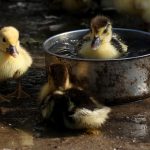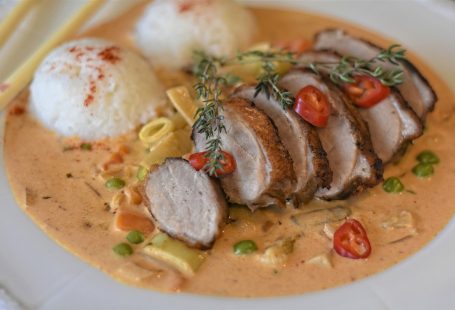Backyard ducks can eat a wide variety of fruits and vegetables, whole grains and meat or fish in addition to their layer feed. A varied diet of healthy treats not only makes life more interesting for them, it makes the ducks healthier and their eggs more nutritious. It also ensures that nothing goes to waste. Our ducks are regularly fed kitchen and garden scraps, both raw and cooked. With a few exceptions, they can eat anything not moldy or spoiled. Wilted, bruised or bug-eaten produce is just fine, as is stale cereal.
Treats for your ducks should be limited to no more than 10% of their daily diet, although ‘green’ treats, such as weeds, cut grass, lettuce, chard, etc. can be fed in unlimited amounts. Ducklings can also eat a variety of healthy treats, as long as they are cut into very small pieces or are soft or mushy to prevent choking. Be sure your ducks of any age always have fresh water and grit (coarse dirt, pebbles or small stones) to help them digest the foods. You will find that your ducks love when you toss some cut-up veggies or fruit into their water tub.
Here are some ideas for nutritious treats:
Ducks enjoy many different types of fruits, including berries, melon, seed and pit fruits. Grapes, bananas, plums, watermelon, pears and peaches are all fine for ducks.
Avoid:
Citrus fruits (lemons, limes, grapefruit, oranges) are thought to interfere with calcium absorption and contribute to thin-shelled eggs. Citrus fruits can also cause acid reflux and stomach pain in ducks.
Mangoes can make ducks’ throats itchy, as it does in some humans. If you do feed your ducks mango, watch them for any reaction. If they seem fine and enjoy it, then it’s okay to feed to them mangoes.
All parts of the avocado plant, including the flesh, can be toxic to ducks.
Many stone fruit pits contain trace amounts of cyanide. Probably not a problem as long as they are only fed in moderation, but if you’re worried, remove the pits and seeds from apricots, apples, cherries, peaches, pears and plums before feeding them to your ducks.
Some favorite veggie treats include cucumbers, peas, zucchini, broccoli and corn. Also kale, collards, cabbage, chard, lettuce and all kinds of squash are great treats. Root vegetables such as sweet potatoes, beets, turnips, carrots, radishes and parsnips are also super nutritious treats but ducks have a far easier time eating them if they are cooked or grated.
Avoid:
Spinach interferes with calcium absorption, and can cause egg binding or soft-shelled eggs, so while extremely nutritious, spinach should be fed only in limited amounts.
Iceberg lettuce has very little nutritional value and can cause diarrhea in large amounts. Instead choose romaine, boy choy, cabbage, kale or collards.
White potatoes are part of the nightshade family and should be avoided, along with other members of the family including rhubarb, green tomatoes and eggplant. All parts of the plant are toxic – leaves, stems and fruit.
Raw, dried beans can be toxic, so beans should only be fed fresh or sprouted to your ducks.
Whole grains are better than white for your ducks. Cooked whole wheat or vegetable pasta, brown rice, millet, quinoa and oats all are good treat options. Whole-grain, sugar-free cereals are also okay in moderation. Sprouted grains including mung beans, alfalfa, broccoli, wheat berry or quinoa are extremely nutritious treats for ducks.
Avoid:
Crackers or any other salty, sugar-laden or fatty foods are bad for ducks, who gain weight easily. Added weight puts too much strain on their legs. Ducks can also easily die of salt overdose.
Bread can not only make your duck overweight if fed in large quantities, but can also lead to impacted crops which can be fatal. In limited amounts, whole grain breads are okay as long as your ducks have plenty of fresh water readily available.
Scrambled eggs are one of our ducks’ favorite treats. Other favorite proteins include dried or live mealworms, earthworms, slugs, crickets, minnows, feeder fish, cooked fish or meat leftovers, lobster or shrimp shells.
Avoid:
Ducks don’t digest nuts and large seeds well. Nuts and seeds can also cause choking or get stuck in the crop since ducks swallow their food whole. If you do feed nuts or seeds to your ducks, they should be ground first.
A wide variety of weeds, herbs and flowers are edible and can be fed to your ducks. Nearly every common weed, all the culinary herbs, and flowers such as nasturtium, roses, marigolds, violets, sunflowers, squash blossoms, and bee balm make tasty treats for your ducks. So next time you clean out the refrigerator or weed the garden, put some of the discards aside for your ducks.






